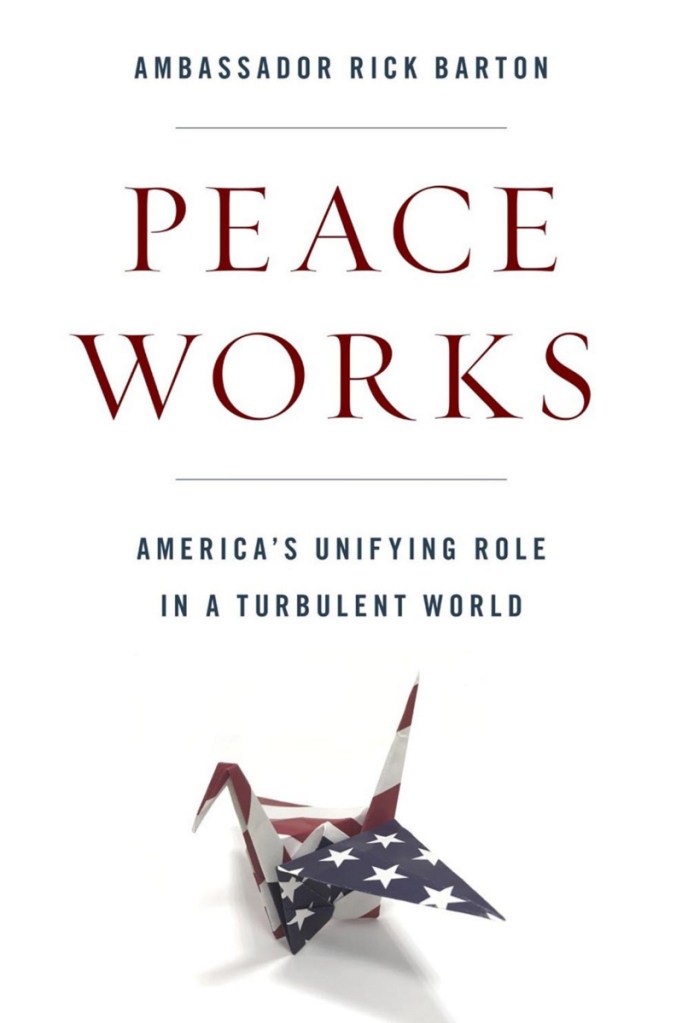Ambassador Rick Barton has led an exciting life. In various capacities at the U.S. State Department and at the United Nations, he has been directly involved in attempting to ameliorate the results of some 40 conflicts around the world. “Peace-building,” as he calls it, has never been easy. “Only sometimes do good things happen, yet we persevere. Why?” Barton asks in his recently published book, “Peace Works.”
“For me,” he answers his own question, “it is the sense that I might make a difference somewhere in the world. There is no universal formula, … but rather a healing process, the subtle guidance of substantial local human energies, and finding new ways to increase our contributions to a more peaceful world.”
Barton, who chaired the Maine Democratic Party from 1986-89, has been indefatigable, as well as extremely courageous, in seeking out those “local human energies” among some of the worst humanitarian flash points of the past quarter-century. Much the best pages of the book are his accounts of these activities in the field. He was the first director of the Office of Transition Initiatives, a small bureau in USAID created to spread democracy in “complex emergencies” from the bottom up. Armed with the fruit of “regular talks, weekly roundtables, and shared writings” of his colleagues, “we jumped into the major conflagrations of the 1990s.”
The learning curve was steep, and Barton who lost his bid to serve Maine in Congress in 1976, gives an admirably frank account of it. During a brief lull in the fighting, his fledgling bureau arrived in besieged Sarajevo. A project aimed at stabilizing the remains of the professional middle class proved unachievable as the war heated up again. OTI was clearly going to be more successful as a “post-bullet program.”
When the bullets did stop flying and he returned, the short-term score-settling all around perplexed him. However, his experiences in Bosnia helped him form the outline of an approach for future foreign challenges: “Spend time with the broadest range of people possible, build a deep understanding of a place, determine the true opportunities, and boost promising ideas.” Seems obvious, Barton admits, “but the United States misses it.”
In Rwanda, Barton was with one of the first American delegations to arrive after the genocide in 1994. His description of the traumatized country is chilling. His own experiences could be hair-raising. Reaching a remote village to learn about the experiences and hopes of its surviving women involved a helicopter ride with “a hung-over Canadian pilot who smelled of whiskey.”
“Peace Works” is intended as a handbook for “practitioners,” and it goes on to describe reconstruction work in Haiti, Iraq, Afghanistan and Syria. Each mission is completed with a “Lessons Learned” section with hortatory subheads, such as “Force Answers to the Most Fundamental Questions about Care, Commitment, and Timing.” All too often, these come across with the self-satisfied detachment of a how-to book for managers. Sapped of the gritty reality from which they have been distilled, they sound simplistic.
“Context is king and having a feeling for the place …. is vital.” Experts may be wrong, Barton warns, but with your ears and eyes open, “insights will accrue.” All of which is surely true, but it is disappointing to read what all these insights boil down to on the page. “In Bosnia, Rwanda, and elsewhere, we saw messianic leaders who accepted apocalyptic results as the natural extension of their egotistical histories.” One could have got that from skimming Time magazine.
There can be no doubt that many of the initiatives Barton describes in “Peace Works” have done their share of good and helped to improve the lot of many people traumatized by events beyond their control. The village meeting in Rwanda led to a project – Women in Transition Initiative – that helped support small businesses and expand the influence of women in the country. In Bosnia alone, he worked variously with a comedy troupe, the courageous editor of an opposition newspaper, and a student organization. The actors made some successful television commercials lampooning the “political class.” Funding for the newspaper increased the flow of information, until its editor was maimed by a car bomb. The student organization “helped produce the critical mass to challenge (Serbian leader) Milosevic.”
Nevertheless Barton leaves one with uncomfortable questions. He himself asks, faced with the horrendous Syrian conflict, “were we just another fig leaf, saving lives but unable to alter the facts on the ground?” It is a brutal question, one that perhaps can only be answered by the parable – adapted from the American philosopher/naturalist Loren Eiseley by many a life coach – of the starfish thrower. He or she, depending on the version, is told, “There are too many of them on the beach. You can’t make a difference.” The starfish thrower spins another out to sea and safety. “I did for that one.”
Thomas Urquhart is a former director of Maine Audubon and the author of “For the Beauty of the Earth.” He can be reached at turq1000@gmail.com.
Send questions/comments to the editors.



Success. Please wait for the page to reload. If the page does not reload within 5 seconds, please refresh the page.
Enter your email and password to access comments.
Hi, to comment on stories you must . This profile is in addition to your subscription and website login.
Already have a commenting profile? .
Invalid username/password.
Please check your email to confirm and complete your registration.
Only subscribers are eligible to post comments. Please subscribe or login first for digital access. Here’s why.
Use the form below to reset your password. When you've submitted your account email, we will send an email with a reset code.